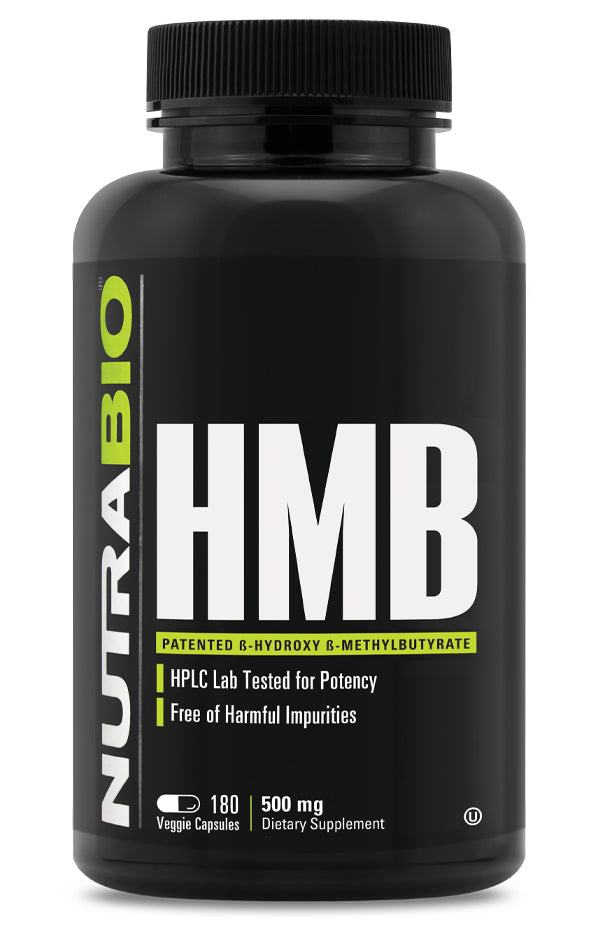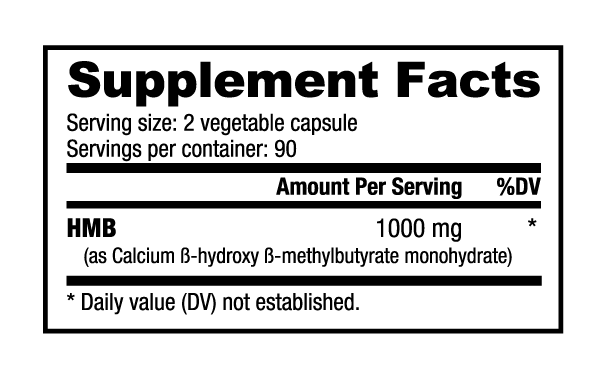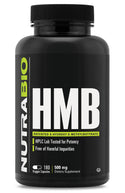Benefits of NutraBio HMB (1000mg)
- Promotes lean muscle mass.
- Minimizes muscle breakdown.
- Enhances protein synthesis.
NutraBio HMB is a clinically proven ergogenic aid that has been shown in over 50 human studies to improve strength and power gains, increase lean mass, and aid recovery. HMB (short for beta-hydroxy beta-methylbutyrate) in an active metabolite of leucine that has both anticatabolic and anabolic properties. Due to these attributes HMB reduces muscle protein breakdown while also inducing muscle protein synthesis. This means HMB can lead to rapid strength gains in less time, significantly increase lean muscle mass, support more complete muscle recovery, and reduce muscle damage from resistance exercise. In fact, a recent position stand by the International Society of Sports Nutrition validates these claims. Based upon the comprehensive review of the HMB literature they concluded that HMB enhances muscle recovery by attenuating muscle damage; HMB increases muscle hypertrophy, strength, and power in trained and untrained populations when the appropriate exercise protocol is applied; HMB efficacy is manifested in young and old; and HMB is safe to consume.
Like creatine, beta-alanine and other well studied and proven performance enhancing compounds, NutraBio HMB makes a solid addition to any athletes training regimen and supplement stack. For example, research has shown when HMB is combined with creatine, the ergogenic benefits, as compared with what could otherwise be achieved by either compound independently, are significantly increased. Furthermore, you can rest assured that the HMB you are getting from NutraBio is an authentic, quality product as we source our HMB from Metabolic Technologies, who holds the use patents on HMB. If your current HMB product doesn't have the Metabolic Technologies HMB logo on the label it is more than likely not HMB.
Quality and transparency. Science instead of hype. Results instead of disappointments. This is the NutraBio way. NutraBio is a name you can trust when it comes to clean and effective supplements. Since 1996 we have been setting the quality standard in the world of sports nutrition. Although the industry makes it seems like non-proprietary blends, proper dosing, and scientifically backed ingredients are something new; the fact is NutraBio pioneered this trend over two decades ago. We have always been the innovators; not the imitators.
With HMB, you make no sacrifices – you get proven and powerful muscle building and recovery benefits without the junk. HMB contains no fillers, excipients, proprietary blends, or other potentially unhealthy or unneeded additives. Only pure, 100% HMB which will support your body's ability to repair, recover, rebuild, and ultimately have you prepared to tackle your next training session.
HOW EXACTLY DOES HMB WORK?
HMB's main physiological functions are its capacity to stabilize the cell membrane of muscles, stimulation of protein synthesis and decrease of protein breakdown. The mechanism is related to HMB's role as an alternate substrate for cholesterol synthesis. The inhibition of cholesterol synthesis results in impaired muscle functions, increased muscular damage and finally, muscular necrosis. In order to maintain membrane integrity, muscle cells rely on cholesterol synthesis. Increased intramuscular HMB may provide readily available substrate for the synthesis of cholesterol needed to form and stabilize the muscle cell membrane. HMB has been shown to up-regulate muscle synthesis by the activation of the mTOR pathway, and to decrease muscle breakdown by influencing the ubiquitin-proteasome dependent pathways of protein degradation. Simply put HMB shifts the balance of protein synthesis, tipping the scale in muscle's favor. When protein synthesis equals protein breakdown, there is no net gain of muscle protein. This is important in maintaining/increasing strength. Therefore, the increase in protein synthesis and decrease in protein breakdown achieved through HMB supplementation results in greater strength gains and faster recovery via net gains in muscle protein.
HOW DOES HMB STACK UP SCIENTIFICALLY?
HMB has been extensively studied in athletes, alone and in combination with other supplements (such as creatine), as an adjunct to exercise to help improve body composition, strength, and performance. More than 50 human clinical studies, 20 review articles and two meta-analyses published in peer reviewed journals have demonstrated HMB's effectiveness in increasing lean body mass, strength, decreasing markers of muscle damage and reducing muscle soreness. Furthermore, HMB's benefits have been demonstrated in trained and untrained individuals, men and women, ranging from young adults to seniors. Let's take a brief look at a few key studies that demonstrates HMB's ergogenic effects.
HMB supplementation improves muscular strength, power and body composition
Strength gains are maximized with the use of HMB. A meta-analysis of resistance-exercise training studies shows HMB supplementation results in increased strength gain. The studies showed increases for trained and untrained, young and elderly, and men and women. While the magnitude of the effect varies with training intensity and population studied, the overall effect was clear. HMB significantly increases strength gains when supplemented during resistance-exercise training.
A 1996 study by Nissen et al. discovered that resistance training in combination with HMB supplementation in 36 women and 39 men with varying levels of training experience for 4 weeks resulted in greater upper body strength (7.5kg for HMB compared to 5.2kg in the placebo group) and greater increases in lean body mass (1.4kg vs. 0.9kg)
A 2016 study conducted by Wilson et al. investigated the effects of 12 weeks of HMB and ATP administration on lean body mass (LBM), strength, and power in trained individuals. A 3-phase double-blind, placebo-, and diet-controlled study was conducted. Phases consisted of an 8-week periodized resistance training program (phase 1), followed by a 2-week overreaching cycle (phase 2), and a 2-week taper (phase 3). Lean body mass was increased by a combination of HMB/ATP by 12.7%.. In a similar fashion, strength gains after training were increased in HMB/ATP-supplemented subjects by 23.5%. Vertical jump and Wingate power were increased in the HMB/ATP-supplemented group compared with the placebo-supplemented group, and the 12-week increases were 21.5 and 23.7%, respectively. During the overreaching cycle, strength and power declined in the placebo group (4.3-5.7%), whereas supplementation with HMB/ATP resulted in continued strength gains (1.3%). In conclusion, HMB-FA and ATP in combination with resistance exercise training enhanced lean body mass, power, and strength.
A 2011 study conducted by Muller aimed to determine whether HMB supplementation would increase the Lean Body Mass (LBM) and muscle power output (measured as the load a subject can bench press) of males who resistance train for recreational purposes, after a combination of resistance weight training, eating a balanced set diet and supplementation with HMB for 8 weeks. Two homogenous groups of 20 males were evaluated for initial strength capabilities and body composition. For 8 weeks the subjects lifted weights three times a week and followed a balanced diet. Creatinekinase activity decreased with HMB supplementation. Gains in muscle power output were greater in the experimental group, and fat percentage decreases were recorded with HMB supplementation.
HMB supplementation reduces markers of exercise induced muscle damage and improves recovery
It's as true for the casual athlete as it is for the serious competitor: people really feel the effects of a workout the next day. Yet, HMB is shown to benefit anyone involved in strenuous activity by minimizing muscle damage. HMB minimizes muscle damage during hard exercise by minimizing protein breakdown. Less protein breakdown means improved muscle cell stability and less membrane damage. This reduction in muscle cell damage (leakage) is measured by a reduction of muscle damage markers such as creatine phosphokinase (CPK) in the blood stream.
A 2013 study conducted by Wilson et al. studied the effects of short-term supplementation with the free acid form of β-hydroxy-β-methylbutyrate (HMB-FA) on indices of muscle damage, protein breakdown, recovery and hormone status following a high-volume resistance training session in trained athletes. A total of twenty resistance-trained males were recruited to participate in a high-volume resistance training session centered on full squats, bench presses and dead lifts. Subjects were randomly assigned to receive either 3 g/d of HMB-FA or a placebo. Immediately before the exercise session and 48 h post-exercise, serum creatine kinase (CK), urinary 3-methylhistadine (3-MH), testosterone, cortisol and perceived recovery status (PRS) scale measurements were taken. The results showed that CK increased to a greater extent in the placebo (329 %) than in the HMB-FA group (104 %). There was also a significant change for PRS, which decreased to a greater extent in the placebo than in the HMB-FA group. Muscle protein breakdown, measured by 3-MH analysis, numerically decreased with HMB-FA supplementation and approached significance. There were no acute changes in plasma total or free testosterone, cortisol or C-reactive protein. In conclusion, these results suggest that an HMB-FA supplement given to trained athletes before exercise can blunt increases in muscle damage and prevent declines in perceived readiness to train following a high-volume, muscle-damaging resistance-training session.
In support of the above study a 2012 study conducted by Sikorski et al. examined the acute effects of HMB free acid supplementation on muscle damage and perceived recovery scale (PRS) when initiating a high-volume resistance-training program. The results showed that when compared to placebo, HMB free acid resulted in decreased CPK indicating decreased muscle damage, and an increase in PRS meaning the subjects felt more recovered 48 hours after the training. In conclusion, HMB free acid minimized the initial muscle damage and improved recovery in trained athletes initiating a high-volume training program.
HMB supplementation improves aerobic performance
HMB improves aerobic performance in average, everyday athletes. HMB is shown to increase maximal oxygen consumption (VO2max) and improve the respiratory compensation point (RCP). It appears that HMB may reduce metabolic acidosis, and the research also shows that it helps athletes tolerate high-intensity activity over a long period of time. Research also shows that HMB lengthens the time to the onset of blood lactate accumulation (OBLA). HMB improves the training status of endurance athletes for positive effects on endurance performance.
In a 2016 study conducted by Jeszka et al., HMB was supplemented in a double-blinded, placebo-controlled, crossover design in 58 highly trained males. To qualify the subjects had to have a minimum of 5 years training and a minimum of 4 sessions weekly in their sport discipline. The authors concluded that HMB had advantageous changes in increasing fat free mass and reducing fat mass, while also improving indicators of aerobic metabolism such as VO2max, time to ventilatory threshold and power at ventilatory threshold.
In a 2015 study conducted by Michalski et al. sixteen elite rowers were supplemented with HMB for 12 weeks in a double-blind, placebo-controlled, crossover study. VO2max increased with HMB supplementation as well as time to ventilatory threshold, threshold load, and threshold heart rate. The researchers concluded that supplementing with HMB was advantageous for endurance athletes in increasing aerobic capacity and power.
In 2001 Vukovich et al. conducted a double-blind switchback study with HMB, leucine, and placebo. The results showed that HMB supplementation increased the cyclists' endurance as measured by VO2 peak and lactate threshold.
HOW TO TAKE HMB
The recommended dosage of HMB is three grams per day for average-size individuals. If you want to "customize" your dosage, research has shown that 38 mg per kg or 17 mg per pound of body weight each day is optimal (see chart for simplified dosage scale). You should divide the daily dosage into two or three equal servings and take these servings spread out over the day.
| Weight | Daily Dosage of HMB |
| 140 lbs. | 2.5g |
| 170 lbs. | 3.0g |
| 200 lbs. | 3.5g |
| 230 lbs. | 4.0g |
| 260 lbs. | 4.5g |
| 290 lbs. | 5.0g |
| (Each 30 lbs. increment) | 500mg or 0.5g |
In regards to HMB timing near or around a training session, we recommend that you take one of your daily servings of HMB an hour before exercise to help reduce muscle damage. If you are unable to take HMB prior to exercise, then take a dose immediately after your workout or training session. For example, if your workout in the evening, take one serving in the morning and one an hour before your evening workout. If you workout in the morning, take your first serving right before or after your morning workout and a second serving at night.
The NutraBio Difference
HMB represents a commitment to quality NutraBio made when we opened our doors 20 years ago. This commitment involves using only the highest quality ingredients backed by research, effective clinical doses, and no proprietary blends, fillers, excipients or other potentially unhealthy or unneeded additives. Although the industry makes it seems like this is a new trend; the fact is NutraBio pioneered these concepts well over a decade ago. For us, it has never been a question of when a good time to start being honest is. We have always been the innovators, not the imitators.
Product title
Vendor
$19.99 | $24.99
Product title
Vendor
$19.99 | $24.99
Product title
Vendor
$19.99 | $24.99
Product title
Vendor




